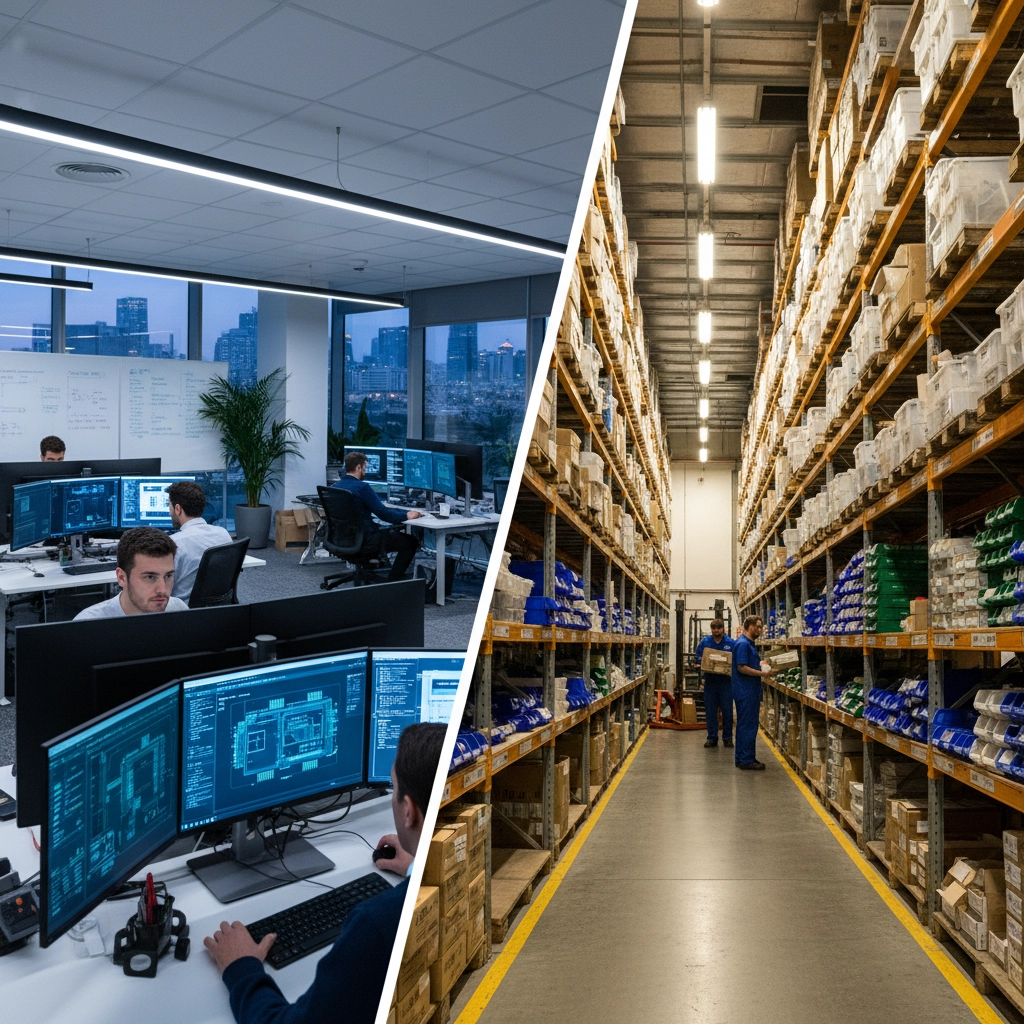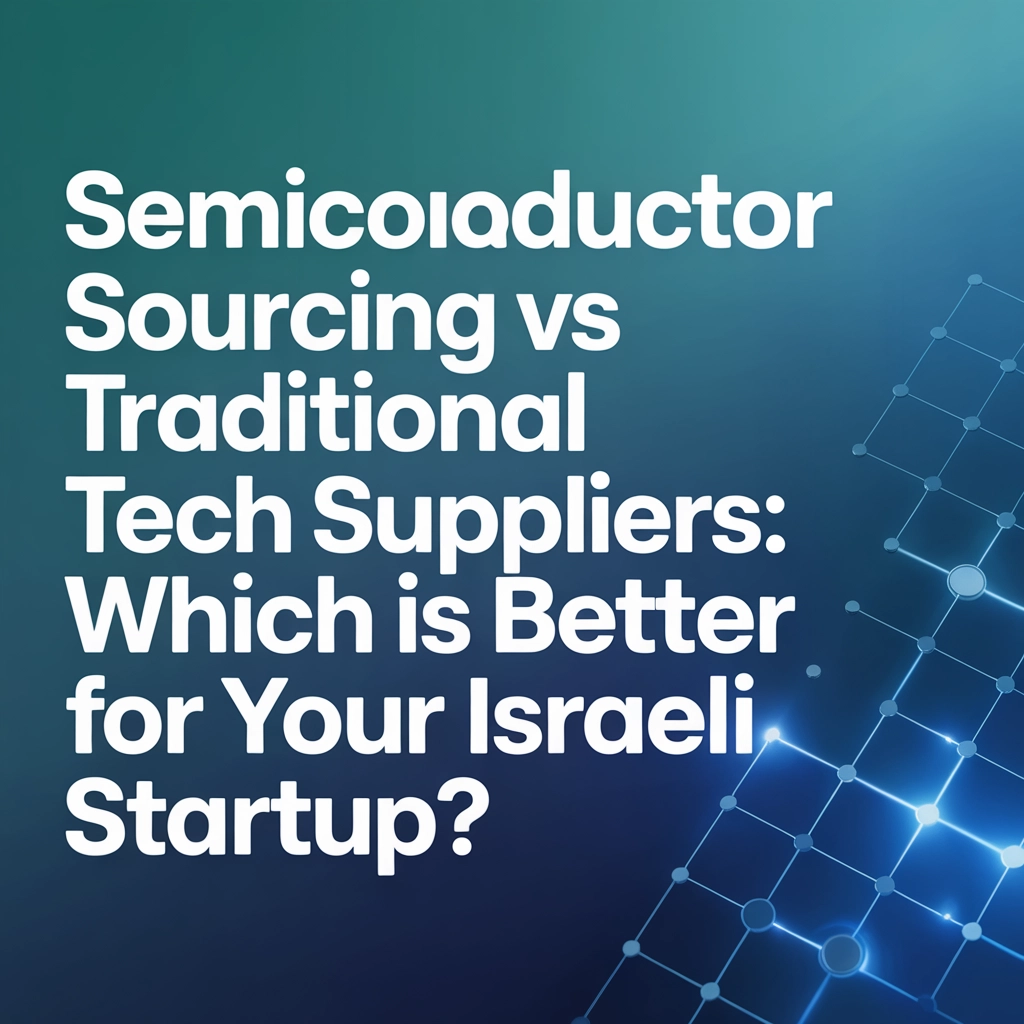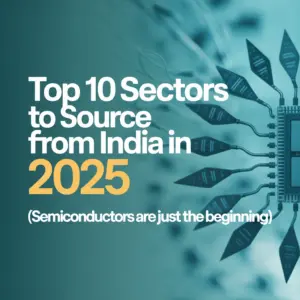If you're running an Israeli startup, you've probably wondered whether to bet on semiconductor sourcing or stick with traditional tech suppliers. It's a big decision that could make or break your company's future. Let's dive into what really matters for your business.
Israel's Semiconductor Advantage: The Numbers Don't Lie
Here's something that might surprise you: Israel punches way above its weight in the semiconductor world. We're talking about 8% of the world's chip design talent crammed into a country smaller than New Jersey. With over 30,000 chip engineers and nearly 200 semiconductor companies, Israel has become a global powerhouse that tech giants can't ignore.
Companies like Intel, NVIDIA, Qualcomm, Cisco, Apple, Amazon, and Microsoft all have major chip design centers here. That's not by accident – it's because the talent and innovation happening in Israel are world-class.
![]()
The Semiconductor Route: What You're Getting Into
The Good Stuff
When you choose semiconductor sourcing, you're tapping into a $450 billion global industry. For Israeli startups, this means access to cutting-edge tech and potential partnerships with some of the biggest names in tech.
The local ecosystem is incredible. You've got research institutions, experienced engineers who've worked at top-tier companies, and a network of suppliers who understand the semiconductor game inside and out. If your product needs custom silicon, AI acceleration, or any kind of specialized processing power, you're in the right place.
The Reality Check
But let's be honest – it's not all sunshine and rainbows. The global semiconductor shortage has shown us just how fragile these supply chains can be. We're talking about situations where a $5,000 chip shortage can cost you $1.7 million in lost sales. That's not a typo.
Israel also has some unique challenges. We've got only two major manufacturing facilities (Intel and Tower Semiconductor), which creates bottlenecks. Plus, geopolitical tensions can mess with operations – just look at what happened during recent conflicts when engineers got called up for military service.

Traditional Tech Suppliers: The Safe Play?
Traditional suppliers offer something semiconductor sourcing doesn't: predictability. You get established supply chains, standardized components, and usually more stable pricing. For startups that don't need cutting-edge chips, this route can get you to market faster with lower upfront costs.
The logistics are simpler too. You're dealing with well-established distribution networks and components that have been tested by thousands of other companies. If you're building software-focused products or using off-the-shelf hardware, traditional suppliers might be all you need.
Breaking Down the Real Differences
Let's get practical about what these choices mean for your startup:
Time to Market: Traditional suppliers usually win here. You can get components quickly without waiting for custom designs or dealing with semiconductor allocation issues. But if your product needs specialized chips, that advantage disappears.
Innovation Potential: This is where semiconductors shine. Custom silicon can give you performance advantages that software alone can't match. In Israel, you have access to the expertise to make this happen.
Financial Impact: Semiconductor sourcing requires more upfront investment and carries higher risk. But it can also lead to higher valuations – tech giants pay premium prices for companies with proprietary chip technology.

Supply Chain Stability: Traditional suppliers typically offer more stable supply chains, but semiconductors give you more control over your destiny once you're established.
The Israeli Startup Reality
Here's something worth considering: Israeli semiconductor companies have historically operated "with the mindset of becoming acquired, not with the mindset of becoming a big company." That's not necessarily bad – it's led to some spectacular exits.
If your goal is to build something that Google, Intel, or Apple will want to acquire, having proprietary semiconductor technology can be your golden ticket. The talent concentration in Israel means you can actually pull this off, unlike in most other countries.
Making the Choice: What Type of Startup Are You?
You Should Consider Semiconductors If:
- Your product needs custom processing power
- You're in AI, machine learning, or IoT
- You have the capital for longer development cycles
- Your target market values performance over cost
- You're building something truly differentiated
Traditional Suppliers Make Sense If:
- You're software-focused
- Time to market is critical
- You're bootstrap funding or have limited capital
- Your competitive advantage isn't in hardware
- You need proven, reliable components

The Hybrid Approach: Best of Both Worlds
Many successful Israeli startups don't pick just one path. They use the local semiconductor ecosystem for R&D and specialized components while relying on traditional suppliers for standard parts. This gives you innovation potential without putting all your eggs in one basket.
For example, you might develop a custom AI chip for your core functionality while using standard memory, power management, and connectivity components from traditional suppliers. It's a balanced approach that manages risk while maintaining competitive advantages.
Risk Management: What Could Go Wrong?
Both paths have risks, but they're different kinds of risks:
Semiconductor risks include supply shortages, geopolitical disruptions, and technical challenges. The recent conflicts in Israel showed how quickly things can change when key personnel get called up for military service.
Traditional supplier risks are more about commoditization and competition. If everyone has access to the same components, it's harder to differentiate your product.
The key is understanding which risks you can manage and which ones could kill your business.
![]()
The Bottom Line
There's no one-size-fits-all answer here. The choice between semiconductor sourcing and traditional tech suppliers depends on your specific situation, goals, and risk tolerance.
If you're building something that could benefit from custom silicon and you have the resources to make it happen, Israel's semiconductor ecosystem gives you advantages that are hard to find anywhere else. The concentration of talent and expertise is real, and the track record of successful exits speaks for itself.
But if your innovation is in software, business model, or market approach, traditional suppliers might be the smarter choice. They'll get you to market faster and let you focus on what really matters for your business.
The most important thing is to be honest about what your startup actually needs to succeed. Don't choose semiconductors just because it sounds cooler, and don't default to traditional suppliers just because it seems safer. Make the choice that gives your specific business the best chance to win.
Whatever you decide, make sure you have backup plans. Supply chains can break, geopolitical situations can change, and markets can shift faster than you expect. The startups that survive and thrive are the ones that can adapt when their original plans don't work out perfectly.




